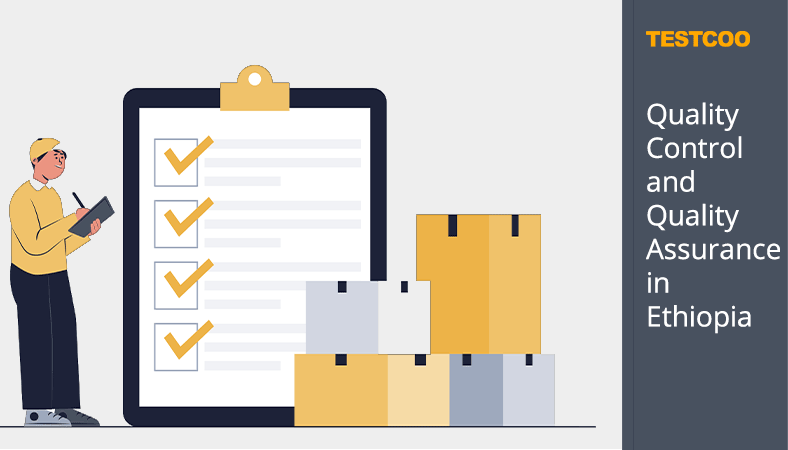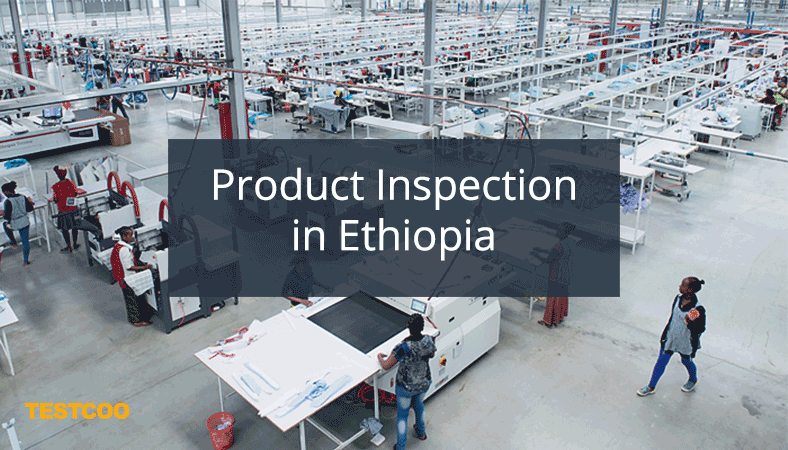Quality Control in Ethiopia – Factory Audit, Inspection and Testing
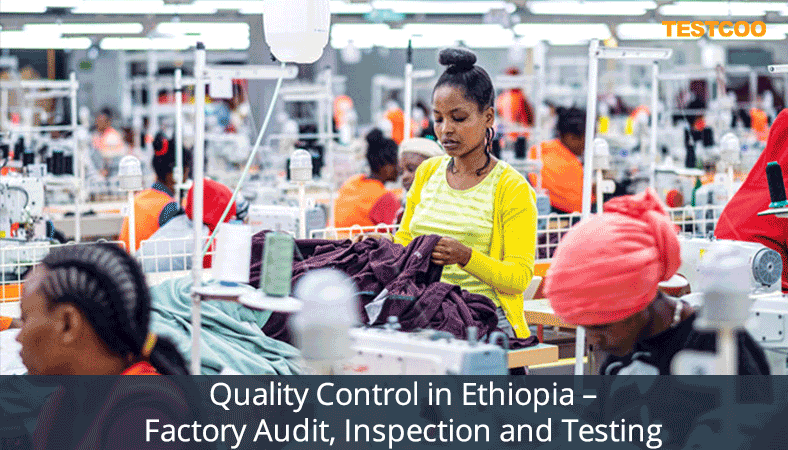
Workers operate sewing machines at a garment factory at the Hawassa Industrial Park in southern Ethiopia. (AFP)
TESTCOO is a leading qulaity control inspection company, we provide factory audit, inspection and testing in Ethiopia.
Ethiopia, officially known as the Federal Democratic Republic of Ethiopia, is a country located in the Horn of Africa. Ethiopia is the most populous landlocked country in the world and the second-most populated nation on the African continent.
Ethiopia is relying greatly on the garment and leather footwear Industry, a fast growing economy that represents the most important growth sector in the country.
Manufacturing Industry in Ethiopia
???
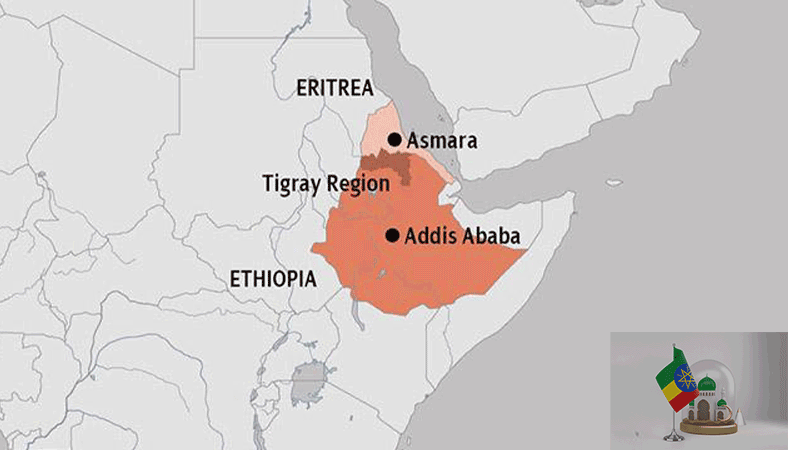
The manufacturing industry in Ethiopia plays a significant role in the country’s economy. Ethiopia’s major industries include agriculture, construction, manufacturing, resources and energy, tourism, and food processing.
Ethiopia’s major goods exports included coffee, gold, cut flowers, oil seeds, chat, pulses, leather and leather products. The top six destinations for Ethiopia’s exports were?Switzerland, Netherlands, the United States, Somalia, Saudi Arabia, and Germany.
Ethiopia has the most prominent manufacturing park in Africa the "Hawassa Industrial Park."
Top fashion brands are sourcing from Ethiopia’s Hawassa Industrial Park, among them, H&M, Hanes, and PVH (Calvin Klein, Izod, Tommy Hilfiger)—employ tens of thousands of Ethiopian workers.
The industries have also led to the production of consumer-ready products like furniture, woven fabrics, jewelry, footwear, baskets, utensils, pottery, farming, and construction products.
The Textile Industry in Ethiopia
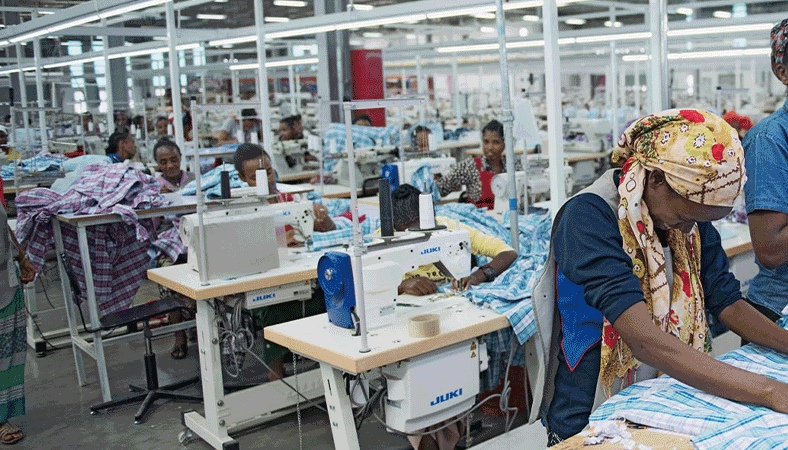
???????Tthiopia-textile-industry
Ethiopian textile sector is one of the rapidly growing industries in Africa and Ethiopia’s sourcing opportunities for companies in the textiles and garments industry have been steadily growing.
Ethiopia has an enormous export potential in the textile and garment industry which is growing annually at about an average of 25% in the past 10 years. Ethiopia has 3 million hectares of land suitable for cotton production. The textile industry produces a full range of products, from natural and man-made yarns, fiber, threads and textiles, to various garments, carpets and home textiles
In the last 10 years, the textile and apparel industry of Ethiopia has shown huge progress. This recent surge in the apparel production made Ethiopia a prime garment exporter to the foreign markets. It is indeed promising for brands, retailers, and suppliers. The government of this country is taking every step to make the apparel sector more globally competitive.
As production costs in Asia continue to rise and Western buyers become more interested in ensuring ethical working conditions, a number of sourcing companies have turned away from Asia and towards Africa.
Brands including Asda, H&M, Primark, Phillips Van Heusen, Tchibo, Tesco, Marks & Spencer, VF Corporation, and Inditex have all begun to source from Ethiopia over the last few years as they seek to increase control of the entire supply chain from cotton to garment.
They are drawn not only by low labor costs, low electricity costs but also by the availability of quality raw materials and by the geographical proximity; Europe can be reached easily via the Suez Canal, reducing delivery times by a third when compared with the Far East.
In addition, many companies are drawn to the perceived social responsibility of the sector in Ethiopia; Ethiopian labor laws conform to International Labor Organization standards.
List of Textile and Garment Manufacturers in Ethiopia
The textile sector has a ton of promise in Ethiopia. The top 10 textile businesses in Ethiopia is below:
- Addis Garment S.C.O
- Kombolcha Textile Share Company (KTSC)
- Ayka Textile
- Bahir dar Textile
- MAA Garment and Textiles
- DH Geda
- Etur Textile PLC
- Yirgalem Addis
- Adama
- BM
Leather Footwear Industry in Ethiopia
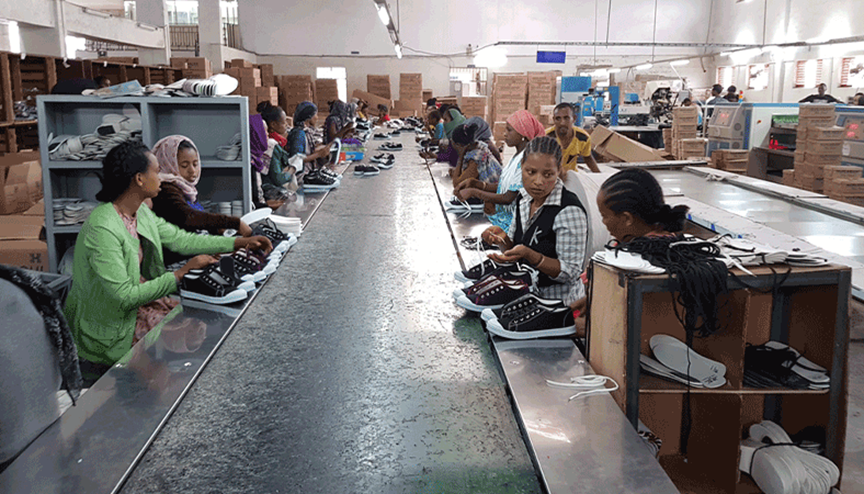
The leather industry has been one of the major traditional industries together with the coffee and garment industries, but it is now at a turning point to change itself from a traditional industry to a modern industry to penetrate the international high value-added leather market, under the strong initiative of the GOE.
Ethiopia possesses one of the largest populations of livestock in the world and the leather industry has been traditionally active, based on the abundance of this resource. The main leather-related export item of Ethiopia is, however, low value-added hides and skins. The leather footwear industry is considered at important sub-sector that leads the whole sector’s modernization.
The main products in the Ethiopian footwear industry are men’s and children’s shoes, because they have less model changes than women’s footwear. Product development of women’s footwear for the domestic market is on the way.
For the international market, however, the mainstream of footwear produced is subcontracted with European factories. European companies order with a sample and Ethiopian factories replicate it precisely.
Shoes Factories in Ethiopia:
- New Wing Addis Shoes Factory
- Ras Dashen Shoe Factory
- Melese Teka Shoe Factory
- O K Jamaica Shoes Factory
- Vilones Shoe Sole Co (pvt) Ltd
- Tikur Abay Shoe Co
- Kangaroo Shoe Factory
- The OLIBERTé Factory
- ???????
Quality Control and Quality Assurance in Ethiopia
Our technicians, inspectors and auditors offer a full range of services: quality control, laboratory tests, supplier audits and quality inspection in Ethiopia. Testcoo has inspectors on the ground to ensure your products meet the quality requirement and comply standards.?
Factory Audit in Ethiopia
When you are cooperate with a new supplier in Ethiopia, it is virtual to audit them as thoroughly as possible. An auditor from a factory or supplier audit helps importers, retailers, and brands verify the capability and compliance of their suppliers in Ethiopia. A factory audit decides whether your potential supplier can deliver the required products and services with expected quality and complies with all necessary industry standards. This factory assessment is typically carried out by Testcoo local quality auditor. Check?Selecting the right social compliance standard:Amfori: BSCI, SA8000, SEDEX SMETA, RBA, WRAP?to learn more.
How Testcoo conduct a factory audit in Ethiopia?
Testcoo verifies your supplier is not a fraud and assesses the systems, capacity, workplace environment, or capabilities to ensure your potential supplier meet your requirements as a buyer.?
1. On-site factory audit
We perform an evaluation of the supplier factory’s on-site quality system, workplace environment, safety hazards, and capabilities. This can be done in accordance with standards set by the client, Testcoo or requirements for certified products.
2. Report
Our auditors work out reports with text and pictures on-site based on their observations as well as their subjective evaluations. It is a time-and cost-effective way to receive a complete profile of your potential supplier.
3. Follow-up audit
We follow up on the initial audit to determine if the supplier factory has made improvements based on the recommendations of the previous report. A factory audit will ensure that your supplier’s quality and sourcing policies comply with your own, before you do any business with them.
Testcoo 3 Most Common Types of Factory audits in Ethiopia
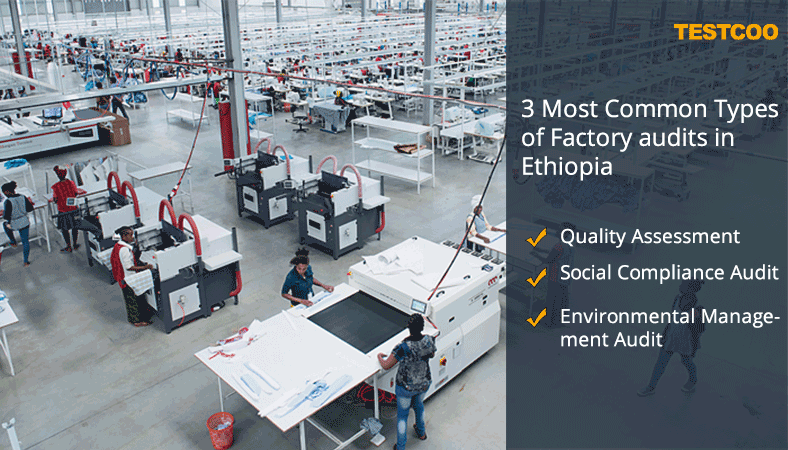
A factory audit ensures that the supplier or vendor can design and produce according to normative requirements. It also ensures that a new or existing manufacturer can deliver quality products, undertake continuous improvements and operate efficiently.
Testcoo 3 most common types of factory audits in Ethiopia:
Factory Quality Assessment is a powerful way to evaluate your potential supplier's reliability and capabilities. Without proper management, buyers could face various risks including financial burden, brand damage and legal disputes arising from failure of suppliers’ performance in social compliance, environmental, technical and security.
The manufacturing in Ethiopia is facing challenges linked to working conditions and workers’ rights. A social audit is a formal review of a company's endeavors, procedures, and code of conduct regarding social responsibility and the company's impact on society.
3. Environmental Management Audit
Environmental management audit – verifies whether the company has met the environmental objectives, policies, and performance set by management. A significant number of manufactures today do more than environmental management audits. They stay one step ahead of compliance and try to proactively improve their environmental performance to improve project and business performance, as well as secure their reputation.
You can learn more about?the various types of factory audits here.?
Testcoo Inspection is contributing to create a value chain that generates business growth, improves working conditions, and promotes labor and environmental standards, and responsible purchasing practices in the cotton and textiles industry in Ethiopia.
Product Inspection in Ethiopia
A production inspection in Ethiopia allows the import to check that their product specifications and quality, functionality and performance requirements have been met.
Product inspections in Ethiopia can be conducted at any stage of the production process. They are available from the initial production setup stage, right through to the pre-shipment and container loading stages.
Types of quality inspection services in Ethiopia:
1. Initial Production Check (IPC)
An Initial Production Check (IPC) is performed on raw materials and first run product. Before mass production, Testcoo inspectors onsite will evaluate the first 10%-30% units produced to ensure compliance with necessary criteria, brand specifications, quality requirements which can firmly establish whether the manufacturer will be able to deliver on the promise to produce a quality product using the correct materials and manufacturing process, and orders shipping on time.
2. During Production Check (DUPRO)
During Production Check (DUPRO) is an essential preventative measure taken in the early stages of production, which can mitigate costly mistakes in the long run by highlighting any problems before too many defective items are produced and avoid effecting the shipping schedule. Quality control inspectors of Testcoo usually perform on-site DUPRO inspections once a minimum of 30%, but no more than 50% of finished goods are produced to ensure consistent quality in the manufacturing process.
3. Final Random Inspection (FRI)
Final Random Inspection (FRI) also called Pre-Shipment Inspections (PSI), is reliable by most of the buys. FRI inspections act as a final check to evaluate product quality, packaging, product labeling and carton markings and ensure that items are correctly packed and fit for their intended use. The FRI takes place at the 100% production completed with a minimum of 80% of goods packed and seated in shipping cartons for verification of your purchase specifications.
The final but crucial step in the quality control process is properly preparing batches for shipping to destination markets. Loading Supervision (LS) is usually performed at the factory, forwarders warehouse, or port to verify count, confirm load, and seal the container. These inspections also ensure that the products are consistent with the packing list of the client, ensure the correct amount of different styles, sizes, and quantities, and that they are properly loaded to minimize the risk of damage during transit.
100% inspection also called full inspection conducted all productions have been completed. The much-needed product inspection is carried out to ensure that the final products are in accordance with the client’s quality standards.
6. Sample Picking Service (SPS)
Sample Picking Service (SPS) is performed when you pick shipment samples or testing samples allowing you to best assess whether the productions meet your quality needs and market standards. Testcoo ensures the samples are picked up from the mass production lot randomly to prevent samples “arranged” by the factory which can’t represent the mass production lot.
Certificate of Conformity for Exports of Regulated Products to Ethiopia
Exporters who ship to Ethiopia any of the regulated products listed, require a Certificate of Conformity pre-shipment and importers will be required to present the original document to Ethiopian Customs for clearance. An electronic copy will be held by the authority for authentication if and when needed.
Regulated Products
Goods regulated under the Ethiopian Mandatory Standards list include the following categories of products:
Metrology and measurement equipment
- Environment, health protection and safety equipment
- Electrical products
- Textile and leather products
- Chemical products (fertilizers, detergents, cosmetics)
- Food products
- Paper, rubber and plastic products
- Construction material
- Stand Alone Solar Products
Import Requirements and Documentation
Includes import documentation and other requirements for both the U.S. exporter and foreign importer. Imports to Ethiopia require:
- Agency agreement
- A bank permit
- A bill of lading or airway bill
- Certificate of origin
- Commercial invoices?
- Customs import declaration
- Foreign exchange authorization
- Import license
- Insurance certificate
- Packing list
- Tax identification number (TIN) certificate
- Pre-shipment inspection clean report of findings
- Transit document
- Value added tax (VAT) Certificate.?
?
Labeling/Marking Requirements
Overview of the different labeling and marking requirements, including any restrictive advertising or labeling practices and where to get more information.
Shipping markings and labeling are required on all imported goods and should be identical on all documents. All imported goods must include product-related information such as expiration date of the product, name of the manufacturing company and name of the product. The Ethiopian Standards Agency oversees these requirements.
Medicines, medical supplies, and medical equipment must be registered with the Ethiopian Food and Drug Authority (EFDA) before entering to Ethiopia. A Certificate of Analysis (COA) is also required for processed food and pharmaceuticals.? For some items depending on their type, specific agency permissions may be required.?
Plants or plant products, including seeds, agricultural inputs such as chemicals, pesticides and fertilizers cannot be imported to Ethiopia unless registered and duly authorized for import by the Ministry of Agriculture.?
Conclusion: Quality Control in Ethiopia
Ethiopia should be a destination on every sourcing team's list for review as an apparel, textiles, and leather footwear supplier.
Testcoo is s a global quality control inspection company with over eight years of experience working with our clients to ensure the safety of the supply chain. Our offices in seven countries ensure you always have an inspection and audit team locally to be your guardian to your offshore suppliers. If you would like to explore quality control inspection in Ethiopia or to discuss your future supply chain challenges.
Please get in touch with us at?sevice@testcoo.com.
Free Sample Report Performance Quality Control
Download a sample report to keep control of your supply chain!
Featured Articles
 AQL Table | How to Read It
AQL Table | How to Read It TOP 10 Common Defects in Garments Quality Inspection
TOP 10 Common Defects in Garments Quality Inspection Product Packaging and Shipment Label requirements for Amazon FBA
Product Packaging and Shipment Label requirements for Amazon FBA What Is ASTM-F2413-18? Protective Footwear Standard
What Is ASTM-F2413-18? Protective Footwear Standard How to Conduct Third-Party Quality Control Inspections for Electric Scooters
How to Conduct Third-Party Quality Control Inspections for Electric Scooters SMETA Audit-What is SMETA Audit?
SMETA Audit-What is SMETA Audit? TESTCOO Supplier Verification/Certification Service SLCP, Higg FEM, GRS, GOTS
TESTCOO Supplier Verification/Certification Service SLCP, Higg FEM, GRS, GOTS Quality Control Inspection Company in China
Quality Control Inspection Company in China What is Quality Inspection? A Complete Guide
What is Quality Inspection? A Complete Guide Guidelines for Product Inspection in India
Guidelines for Product Inspection in India
Category
- Production Inspection Service
- Factory Audit
- Softline Inspection
- Hardline Inspection
- Electrics Inspection
- Certification
- Checklist
- Manufacturers
- Quality Assurance Basics
- Products Recall
- AQL
- Guidence and Standard
- News
- Supplier Management
- Amazon
- Protective Equipment
- e-commerce quality control
- Indian Manufacturing
- Soft Goods Quality Control
- Supply Chain Management
- Supply Chain Resilience
- E-Commerce Quality Control
- ISO 2859
- Supply Chain Optimization
- Garment Industry
- Higg Index
